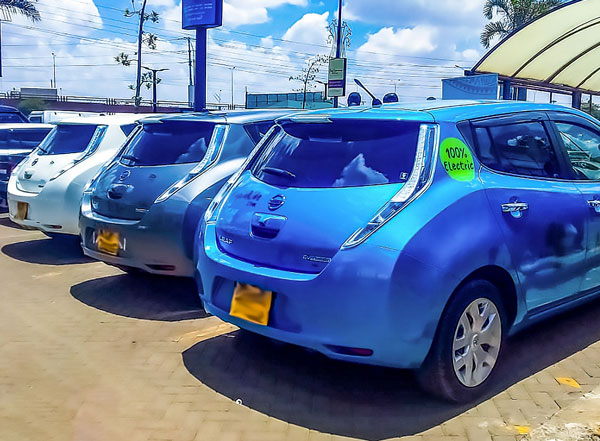
Stung by price pressure, some cab operators in Africa are pushing to electrify their fleets, while others adopt hybrid and LPG-powered versions
SPECIAL REPORT | BIRD AGENCY | Consumers love cheaper rides and there’s always a driver willing to take less per ride. To cushion themselves from losses, many taxi and rideshare drivers are turning to smaller, fuel-efficient cars, hybrids, LPG-powered, and fully electric vehicles.
This trend, driven by both economics and a growing environmental consciousness, has begun to reshape the taxi industry across Africa.
It also comes as the continent sees a shift in attitudes to polluting staples like plastic and fossil fuels, according to a report released by a unit at bird story agency, The African Climate Awareness Report 2023..
As cities across Africa expand, shared mobility is also surging as consumers demand convenient, cost-effective, and sustainable modes of travel in urban areas.
According to the latest Statista figures, revenue in the shared mobility market on the continent is projected to reach US$25.81 billion in 2023.
“The market’s largest market is the shared vehicles market with a projected market volume of US$18.28bn in 2023. In the Shared Vehicles market, the number of users is expected to amount to 698.60m users by 2027.”
Ryan Kanyandoug’, chief executive of Digital Taxi Forum (DTF), the lobby for drivers using cab-hailing apps in Kenya notes that price is what is driving change in the industry.
“We want better rates for our services…we are charged so many fees that make it difficult for us to operate. Therefore, some drivers have decided to adopt fuel-efficient cars to avoid losses,” he told bird.
“What this means is that consumers will be forced to sacrifice comfort for affordability.”
These price wars are now radically transforming the age-old taxi industry, a mainstay in many African urban centres, where the car and motorbike taxi industries were the first to absorb EVs.
Outside of EVs and coming on the heels of growing concerns about carbon footprints and soaring fuel costs, cab companies across the continent are turning to hybrid cars, LPG and mass transport solutions to stay competitive and sustainable.
In major hubs like Nairobi, Lagos, and Johannesburg, there’s been a noticeable increase in the number of hybrid vehicles donning taxi colours.
Hybrid cars, which combine a petrol or diesel engine with an electric motor, offer lower fuel consumption and emissions than conventional cars.
They are also cheaper to maintain and operate than EVs, which require charging infrastructure and battery replacement.
Hybrid cars are especially suitable for urban areas where traffic congestion and air pollution are high. Some of the hybrid models that are available in the African market include the Toyota Prius, Honda Insight, Hyundai Ioniq and Kia Niro
These vehicles, which combine a conventional engine with an electric motor, offer significantly improved fuel efficiency. For cab operators, this translates to reduced fuel costs, allowing them to offer more competitive rates to riders.
While EVs and hybrids represent the future, LPG (liquefied petroleum gas) is being hailed as a transitional fuel for many taxi operators.
Emitting fewer pollutants than traditional fuels and being substantially cheaper, LPG conversions have become increasingly popular among taxi operators.
Electric taxis are no longer a novelty but a growing reality in many African cities. From Accra’s pilot projects to the sprawling streets of Cairo, cab companies are investing in EVs. The benefits are multifaceted: Besides environmental advantages, electric taxis promise lower operating costs in the long run.
Rideshare giant Uber, meanwhile, is collaborating with African authorities to formulate policies promoting the uptake of EVs as it plans a wider deployment.
This electrification drive is also receiving governmental support. Incentives, subsidies, and the development of charging infrastructure is making it feasible for taxi operators to make the switch.
It’s not just the conventional taxi getting an eco-friendly makeover. Mass transport solutions, such as electric buses and shuttles, are emerging as alternatives to individual rides.
Companies are capitalizing on the growing urban populace’s need for efficient, affordable, and environmentally friendly transport, especially for daily commutes.
Bus rapid transit systems (BRT) in cities like Dar es Salaam and Addis Ababa have shown that when reliable mass transport is offered, it can effectively reduce the number of individual vehicles on the road, slashing both costs and emissions.
For consumers, the push towards greener taxis and transport means not only potentially cheaper rides but also a reduced environmental impact with each journey. For taxi operators, long-term savings promise better profit margins.
******
SOURCE: bird story agency
 The Independent Uganda: You get the Truth we Pay the Price
The Independent Uganda: You get the Truth we Pay the Price



